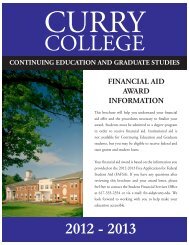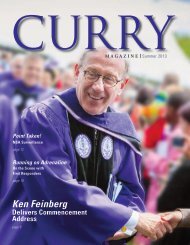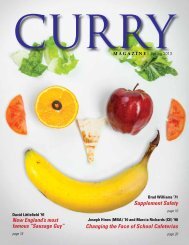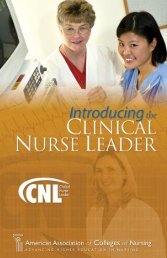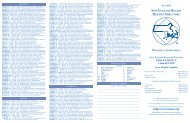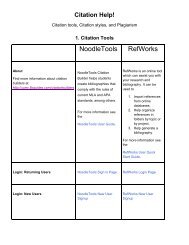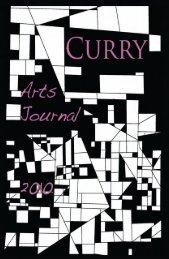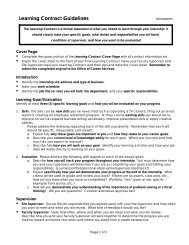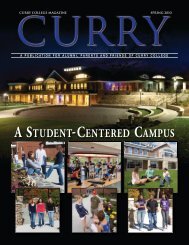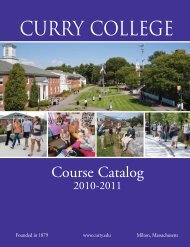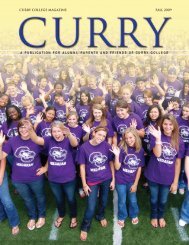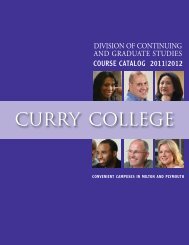Read the Curry College NEASC 2012 Self-Study Report.
Read the Curry College NEASC 2012 Self-Study Report.
Read the Curry College NEASC 2012 Self-Study Report.
You also want an ePaper? Increase the reach of your titles
YUMPU automatically turns print PDFs into web optimized ePapers that Google loves.
24<br />
Increased opportunity for study abroad.<br />
Improved structure of clinical placements to increase clinical supervision.<br />
o Created ACCEL, accelerated 18‐month second degree B.S. in Nursing cohort<br />
program offered through Continuing Education.<br />
• Politics and History<br />
o Added African American Studies Minor.<br />
• Program for Advancement of Learning<br />
o Completed learning outcomes curriculum project evaluating metacognitive<br />
learning.<br />
o Conducted comprehensive self‐study in 2010‐2011.<br />
• Psychology<br />
o Added Gerontology and Substance Abuse concentrations and minors.<br />
o Introduced new course “Get Psyched” as entry point to <strong>the</strong> major.<br />
o Conducted comprehensive self‐study in AY2010‐2011.<br />
• Sociology and Criminal Justice<br />
o Integrated significant field experiences early in <strong>the</strong> curriculum.<br />
o Increased focus on internship experiences and realignment of courses in<br />
curriculum with Police Career Incentive Pay Program (PCIPP) standards.<br />
<strong>Curry</strong> has also focused on significant learning experiences that extend both beyond <strong>the</strong><br />
classroom and beyond specific disciplines, including:<br />
• First Year Inquiry Groups, learning communities designed to provide early opportunities<br />
for engagement and <strong>the</strong>med inquiry with a cohort of peers;<br />
• Increased internships and o<strong>the</strong>r experiential learning opportunities;<br />
• E‐portfolio pilots in multiple areas to provide for self‐reflection and for area‐specific<br />
learning outcomes assessment.<br />
General Education<br />
<strong>Curry</strong>’s Central Liberal Arts Curriculum (CLAC) has been in existence since 1981, with its first<br />
comprehensive re‐design in 1991, and a current re‐design effort expected to conclude in Spring<br />
<strong>2012</strong>. As described in <strong>the</strong> Catalog and to incoming students in an Orientation resource book, liii<br />
<strong>the</strong> current CLAC includes distribution requirements at both <strong>the</strong> introductory and intermediate<br />
levels, specifically with 40‐44 credits in introductory courses required across 14 areas of study<br />
and 18‐20 credits outside a student’s major required at <strong>the</strong> 2000 and/or 3000 level. Such<br />
requirements are designed with explicit attention to <strong>the</strong> <strong>College</strong> mission statement and <strong>the</strong><br />
educational goals of thinking critically, communicating effectively, understanding context,<br />
appreciating aes<strong>the</strong>tic experience, defining personal identity, examining value systems, and<br />
adapting and innovating.<br />
As evident in <strong>the</strong> list of requirements, CLAC provides broad breadth of content for students of<br />
all majors across <strong>the</strong> Arts and Humanities, Sciences and Math, and Social Sciences. Multiple<br />
course requirements to advance written and oral communication, critical analysis, and<br />
technology/ information literacy are also explicitly required. Such requirements provide <strong>Curry</strong><br />
graduates with knowledge of scientific, historical, and social phenomenon and experiences in<br />
<strong>Curry</strong> <strong>College</strong> <strong>2012</strong> <strong>Self</strong>-<strong>Study</strong><br />
Standard Four




